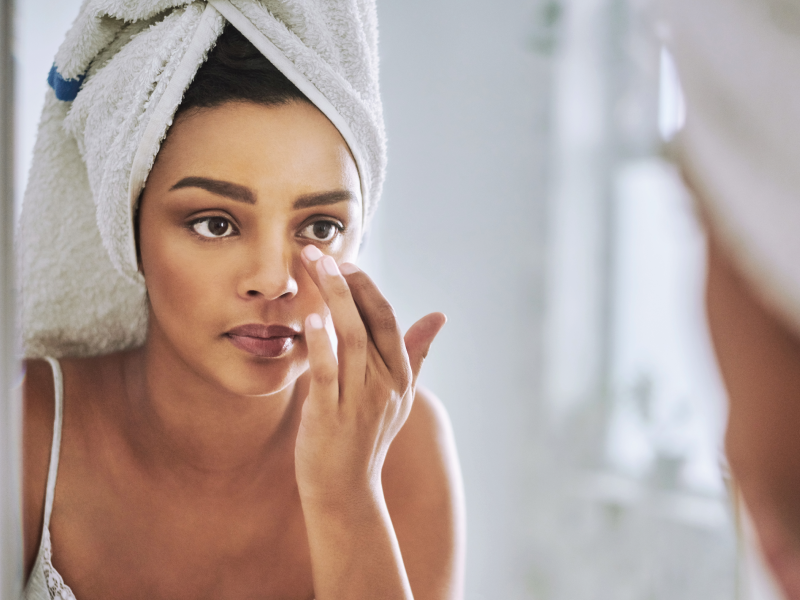
Dry, Irritated Eyes? Avoid These Hidden Ingredients in Your Beauty and Skincare Products
You probably already know that late nights and too much screen time can irritate your eyes, but did you know ingredients in common skincare products and makeup can do the same? Cosmetics on the skin and around the eyes are used often by some, but almost everyone uses facial skincare products every day in the form of cleanser, moisturizer, anti-aging products, and sunscreen. It is important to be aware of the ingredients in these products and how they can affect your eyes.
Hidden Causes of Eye Irritation
These products could contain chemicals that are irritating your eyes, causing or worsening dry eye disease or its symptoms, blepharitis, or meibomian gland dysfunction. Dry eye and meibomian gland dysfunction symptoms include itchy, dry, gritty-feeling eyes, burning, stickiness, watering of the eyes, or eye redness. Avoid the following ingredients:
- Alcohol
- Acetyl hexapeptide-3
- Benzalkonium chloride (BAK or BAC)
- Butylene glycol, ethylenediaminetetraacetic acid (EDTA)
- Formaldehyde and formaldehyde donors
- Isopropyl cloprostenate
- Parabens
- Phenoxyethanol
- Retinol
Protect Your Eyes
Stay away from the chemicals listed above to help deter eye irritation, prevent the disruption of the proper function of your meibomian glands, which help keep your eyes moist, and to maintain the health of your eyes. For example, in some studies, benzalkonium chloride, a commonly used preservative in eye drops, has been linked to toxicity of the corneal epithelium, which covers the front of the cornea and acts as a protective barrier to keep dust, water, and bacteria out of the cornea. Prime yellow carnauba wax and other waxes are used in mascara and eyeliners to stiffen the product and make them waterproof; however, waxes can clog meibomian glands and cause or exacerbate dry eye symptoms.
Parabens are preservatives that are used to prevent the growth of bacteria in makeup and skincare products such as face creams and moisturizers, cleansers, shaving gels, aftershaves, and sunscreens. Parabens can make eye irritation and dry eye symptoms worse since they can prohibit the meibomian glands from secreting enough oil to keep the eyes properly lubricated. Parabens are a family of chemicals, so you should avoid anything with the suffix “-paraben” such as propylparaben and isobutylparaben as examples.
What Can You Do?
Our doctors recommend reading product labels so you can avoid these ingredients to help protect your eyes and overall vision. Do research on the skincare and cosmetic products you are using now, keeping in mind that some of these chemicals may be listed under different names, so you may want to look up unfamiliar compounds online to get further information about them. If your products contain any of the substances cited here, you should consider discontinuing their use and try to find other products that do not include these ingredients. If you use eye drops, check the ingredients and consider using preservative-free drops. Avoid any eye makeup labeled as “waterproof”, since those products can lead to or worsen dry eye symptoms. If you are using waterproof products because your eyes water a lot, you should schedule an appointment with your optometrist to determine the cause.
There are several companies that track what is in many personal care products and have done some of the work for you. Good sources from which to start your research include the Environmental Working Group, which has investigated and tested thousands of products for the chemicals they contain. Think Dirty is another company that has researched and published lists of products with safe ingredients. Both Think Dirty and EWG also have apps available for iOS and Android phones and devices.
If you are experiencing any eye irritation or dry eye symptoms, call Midwest Eye Consultants today or request an appointment online with one of our doctors. In addition to removing these chemicals from your personal care regimen, the doctor may recommend a procedure called LipiFlow, which can help unclog blocked meibomian glands and suggest a course of treatment, such as warm compresses, eye massage, and/or artificial tears to help relieve symptoms.
I’ve read that you need to avoid oil’s in eye make up removers if you have dry eyes/blepharitis. Does that include tea tree oil and jojoba oil?
Hello, I am not an expert but I am just sharing what I think I know aa one of goolgers who came across this article. I have acne-prone, combination skin so I have used the oils mentioned by you. While they are all oil, Jojoba oil is base oil much more milder, tea tree oil is known to be one of “bold“ essential oils, tea tree oil might make your eyes sore if put in eye. I recommend you put it just around the eyes (where you can feel the bone underneath) not exactly on the eyelids or in eyes.
Antother Ophthalmologist website said coconut oil can block Meibomian Glands! Anyone now if this is true?
Hello, This information is very useful!
Thanks For Sharing!